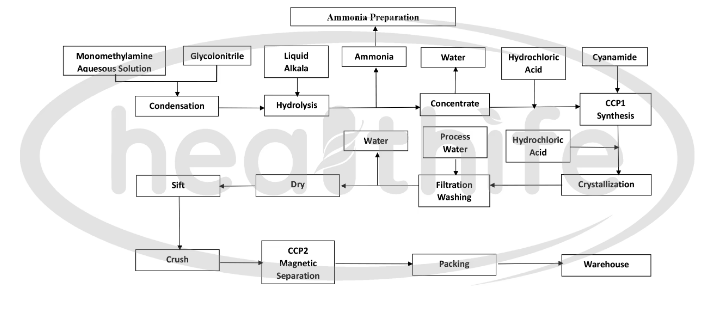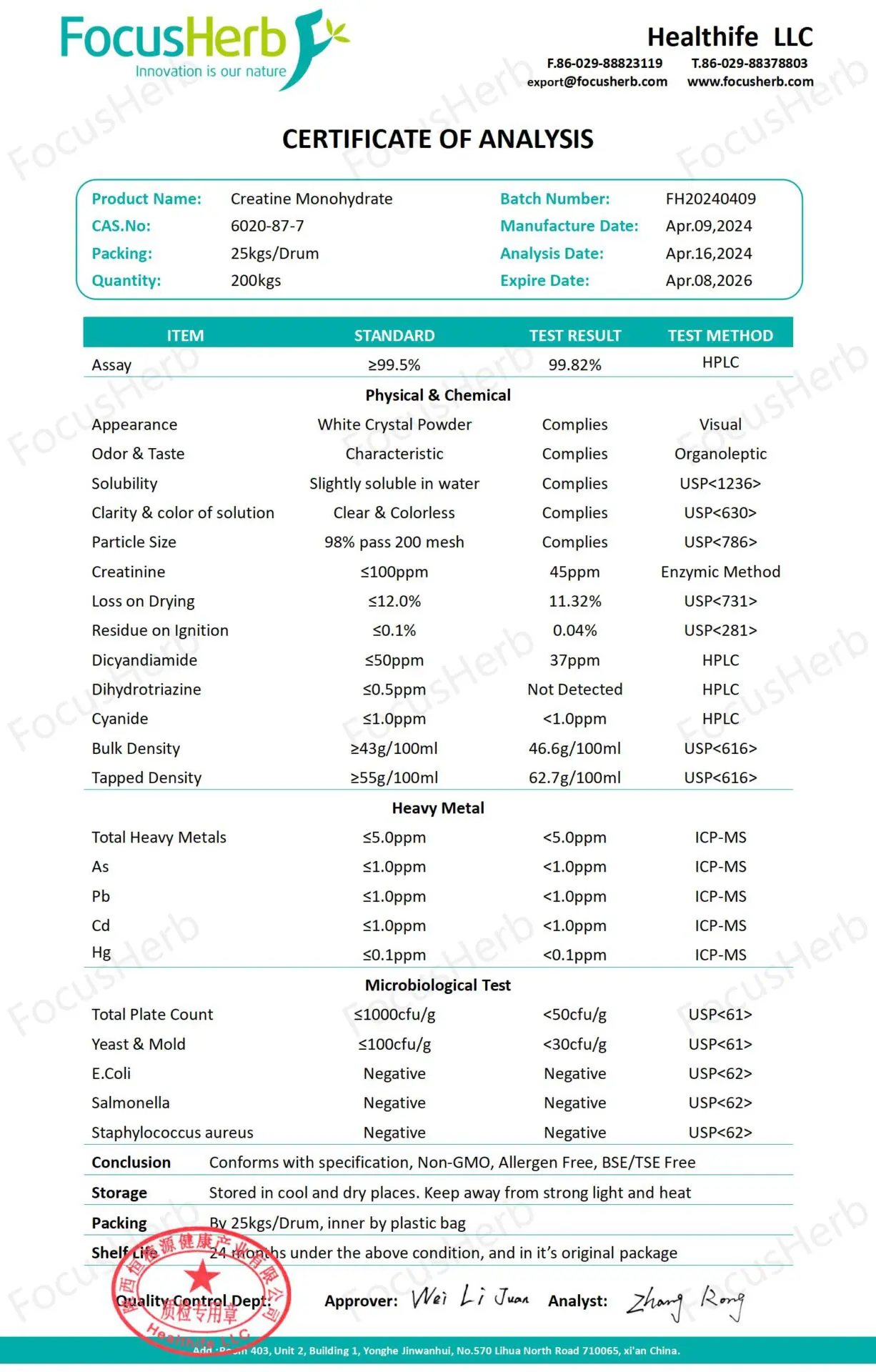Food and Nutrition Ingredients
Creatine Monohydrate
- Product Name: Creatine Monohydrate
- Cas No.: 6020-87-7
- Spec./Purity: 99%
- Molecular Formula: C4H9N3O2•H2O
- Appearance: White Powder
- Shelf Life: 36 Months
PRODUCT INTRODUCTION
What’s Creatine Monohydrate?
Creatine monohydrate is a natural compound found in small amounts in certain foods and is synthesized in the body from the amino acids glycine, arginine, and methionine. It is primarily stored in muscle and plays a key role in the production of adenosine triphosphate (ATP). ATP is the body’s main source of energy, especially during short bursts of intense physical activity, such as weightlifting, sprinting, or explosive exercise.
The Characteristics of Creatine Monohydrate
| Product Name | Creatine | Creatine Monohydrate |
| Cas No. | 57-00-1 | 6020-87-7 |
| Spec./Purity | 99% | 99% |
| Molecular Formula | C4H9N3O2 | C4H9N3O2•H2O |
| Appearance | White Powder | White Powder |
| Shelf Life | 36 Months | 36 Months |
Creatine Monohydrate
Creatine monohydrate is a natural substance that is converted into creatine phosphate in the body. Creatine phosphate helps to produce a substance called adenosine triphosphate (ATP). ATP provides energy for muscle contraction. ATP is one of the most common supplements people take to increase muscle mass, improve athletic performance, and increase strength. It is also the most popular and effective bodybuilding supplement on the market today because it can quickly increase muscle size and strength.
 The Production Process of Creatine Monohydrate
The Production Process of Creatine Monohydrate

Benefits of Creatine Monohydrate
Creatine monohydrate is one of the most widely used and studied supplements, particularly for enhancing athletic performance and promoting muscle growth. Here are some of the key benefits of creatine monohydrate:
Improve athletic performance
During intense exercise, the energy supply of human muscles mainly depends on the decomposition of adenosine triphosphate (ATP). However, the amount of ATP stored in muscles is limited and can only sustain high-intensity exercise for a few seconds. Creatine monohydrate plays a key role in this process. It can react quickly with adenosine diphosphate (ADP) under the catalysis of creatine kinase to resynthesize ATP and provide continuous energy for muscles.
Related studies have shown that after sprinters continue to supplement creatine monohydrate for a period of time, their 50-meter and 100-meter performances have improved significantly. Similarly, for weightlifters, when performing high-weight barbell weightlifting, muscles instantly need huge energy. Creatine monohydrate can help them burst out stronger power in a short period of time and lift heavier weights.
Promote muscle growth
Creatine monohydrate promotes muscle growth in a variety of ways. First, it increases the water content of muscle cells, causing them to swell. This swollen state provides more “space” for muscle cells, stimulating the activation of signaling pathways associated with muscle protein synthesis.
Second, creatine monohydrate provides sufficient energy for muscle protein synthesis by increasing the level of creatine phosphate in the muscles. Muscle protein synthesis is an energy-consuming process, and sufficient energy supply helps to maintain this process efficiently. Fitness enthusiasts who take creatine monohydrate for a long time and combine it with appropriate strength training can clearly see an increase in muscle size and clearer muscle lines.
Accelerated fatigue recovery
During exercise, muscles will produce fatigue substances such as lactic acid due to continuous contraction and metabolism. When these substances accumulate to a certain extent, they will cause muscle fatigue and soreness. Creatine monohydrate can accelerate the removal of lactic acid and restore the lactic acid level in the body to normal faster. This is because creatine monohydrate participates in the energy metabolism cycle in muscle cells, promotes the reuse of lactic acid, and converts it into energy substances that can be reused by the body.
At the same time, creatine monohydrate helps repair damaged muscle tissue. During exercise, muscle fibers will be slightly damaged. Creatine monohydrate accelerates the repair of damaged muscle tissue by providing energy to muscle cells and promoting protein synthesis.
Potential health benefits
In addition to its significant effects in the field of sports, creatine monohydrate also shows potential health benefits in other aspects. In terms of metabolism, studies have shown that creatine monohydrate may be involved in regulating the human energy metabolism process and improving the efficiency of human energy utilization. This means that the body can complete more physiological activities while consuming the same amount of energy, which helps maintain the body’s normal metabolic function.
In terms of cognitive function, creatine monohydrate also has a positive effect on the brain. The brain is a high-energy-consuming organ that requires a continuous supply of energy to maintain its normal functions, such as thinking, memory, and attention. Creatine monohydrate can enter the brain through blood circulation, provide additional energy reserves for brain cells, and improve the energy metabolism of brain cells.
Have any questions?
Let's get in touch!
Contact us if your are thinking of purchasing highquality ingredients, develop new products, or justsolving a manufacturing challenge in your rawmaterials.




















 The Production Process of Creatine Monohydrate
The Production Process of Creatine Monohydrate